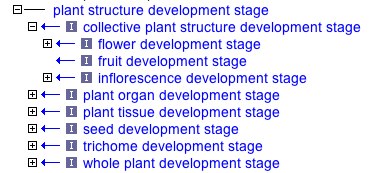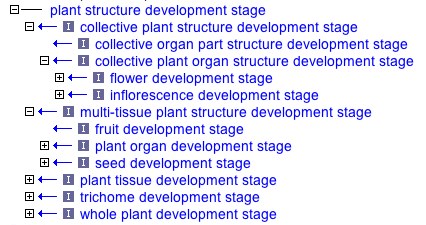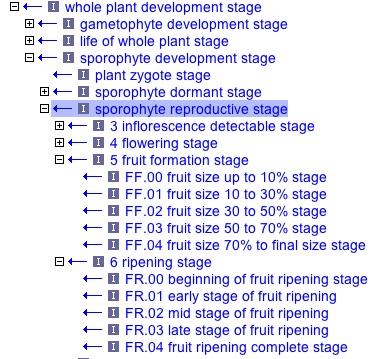POC Conf. Call 8-14-12
POC meeting, Webex Conference Call; Date: Tuesday Aug 14th, 2012 10am PDT/1pm EDT
In attendance:
POC members:Laurel Cooper (OSU), Ramona Walls (NYBG), Justin Elser (OSU), Pankaj Jaiswal (OSU), Marie Alejandra Gandolfo (Cornell), Justin Preece (OSU), Barry Smith (University at Buffalo, NY)
Absent:Dennis Stevenson (NYBG), Chris Mungall (Lawrence Berkeley National Lab)
Collaborators: none
Any changes or corrections (additions/deletions, etc) needed in the minutes from the POC_Conf._Call_7-31-12?
Back to POC Meetings Minutes
Streaming recording link: https://ontology.webex.com/ontology/ldr.php?AT=pb&SP=MC&rID=67425627&rKey=23c3eed5403eb53e
Download recording link: https://ontology.webex.com/ontology/lsr.php?AT=dw&SP=MC&rID=67425627&rKey=9370270c79ef6911
Aligning the top levels of plant structure development stage to plant structure
We have re-organized the top levels of plant structure (PO:0009011), so the children of plant structure development stage (PO:0009012) should be re-organized to correspond.
We do not really need to add a term for "collective organ part structure development stage" at this point, but omitting it may create confusion.
We had a discussion about whether or not it is necessary to mirror all the upper level terms from the PAE or just the relevant parent categories for the classes such as "flower development" or "corolla development. Decided that it needed additional study and that for the mean time, we will develop the hierarchy with out them and compare the two approaches
Plant tissue development stage refers to the development of a "portion of plant tissue" which is a child of plant structure.
Currently we do not cover the development of plant cells, as this is more the area of GO. Need to check with the GO if they have stages, or just processes described. RW: GO has terms for cell cycle phases like telophase and cytokenesis, but their definition sound like a mixtures of process and stage. They also have terms for oogenisis stages (GO:0022605 and children), but they have no is_a parent (part_of oogenesis).
Some cases are specific to plants such as cell wall development stage, or cell death for xylem cells.
One way to deal with the 'unnatural sounding' upper level terms is through the development of slims and using OntoFox. See their page for more details.
There was a comment about the integration of anatomy and development in the Zfin ontology, but in reality they have a simple list of stages as a separate branch along side the anatomy ontology.
New terms
In principle, we agreed on these definitions, but for now we are going to try to develop this part of the ontology without these upper level terms.
Multi-tissue plant structure development stage
multi-tissue plant structure development stage (PO:new term), proposed def.: A plant structure development stage (PO:0009012) that has as primary participant a multi-tissue plant structure (PO:0025496).
comment: Examples include plant organ development stage (PO:0025339), fruit development stage (PO:0001002), and seed development stage (PO:0001170).
This term is needed as a parent to fruit development stage (PO:0001002), which we need to work on the grape annotations.
collective plant structure development stage
collective plant structure development stage (PO:new term), proposed def.: A plant structure development stage (PO:0009012) that has as primary participant a collective plant structure (PO:0025497).
Comment: Includes collective plant organ structure development stages (PO:0025338) such as flower development stage (PO:0007615), corolla development stage (PO:0007604), and inflorescence development stage (PO:0001083), as well as collective organ part structure development stages (PO:id).
collective organ part structure development stage (PO:id), proposed def.: A collective plant structure development stage (PO:id) that has as primary participant a collective organ part structure (PO:0025269)
comment: This term currently has not sub-classes, but can used for development stages of collective organ part structures (PO:0025269) such as a septum (PO:0000030) or pseudostem (PO:0025248).
Existing term:
collective plant organ structure development stage (PO:0025338), proposed revised def.: A collective plant structure development stage (PO:id) that has as primary participant a collective plant organ structure (PO:0025007).
comment: Examples include flower development stage (PO:0007615), corolla development stage (PO:0007604), and inflorescence development stage (PO:0001083). This was formerly named collective plant structure development stage.
Fruit development stages for fruits and whole plants
existing whole plant development stage terms
All of these definitions should be reworded to make it clear that they refer to development stages of a whole plant. Technically, saying that they are fruit formation stages does that, but it is not obvious to readers. Names should also be changed accordingly.
Agreed after some discussion. We will proposed names and revised definitions at a meeting in the near future.
Discussed how these stages are not identified by a single fruit but by averaging across the fruits on a plant. We may want to add a comment about this.
These terms will probably not work for plant that have asyncronous fruiting, like indeterminate tomatoes.
For development stages of fruits (rather than whole plants with fruits), see Items_for_future_meetings#Fruit development stage (PO:0001002) and subclasses
- FF.04 fruit size 70% to final size stage (PO:0007027): A fruit formation stage that spans the interval when a fruit has reached 70% of its final size to its final size.
related synonyms: BBCH principal growth stage 75; BBCH principal growth stage 79
Add related synonym: BBCH principle growth stage 77; Berries beginning to touch
Add related synonym: grape E-L stage: 31 Berries pea-sized (7mm dia), bunches hang, (BBCH 75)
Add related synonym: grape E-L stage: 32 Beginning of bunch closure, berries touching (if bunches are tight), Berries beginning to touch (BBCH 77)
Add related synonym: grape E-L stage: 33 Berries still hard and green, Majority of berries touching, (BBCH 79)
- FR.00 beginning of fruit ripening stage (PO:0007036): The stage at which fruit maturation begins.
Add related synonym: BBCH principle growth stage 81; Beginning of ripening: berries begin to develop variety-specific colour
Add related synonym: grape E-L stage: 35 Berries begin to colour and enlarge, beginning of veraison
- FR.01 early stage of fruit ripening (PO:0007001): The early stage in fruit ripening
related synonym: BBCH principal growth stage 83
Add related synonym: middle of veraison
- FR.04 fruit ripening complete stage (PO:0007038): The stage at which fruit ripening is complete.
related synonym: BBCH principal growth stage 89
Add related synonym: grape E-L stage: 38; Berries ripe for harvest
References:
Coombe (1995) Growth Stages of the Grapevine: Adoption of a system for identifying grapevine growth stages. Australian Journal of Grape and Wine Research 1: 104–110 link
Lorenz et al (1995) Growth Stages of the Grapevine: Phenological growth stages of the grapevine (Vitis vinifera L. ssp. vinifera)—Codes and descriptions according to the extended BBCH scale†. Australian Journal of Grape and Wine Research 1: 100–103 link
Fruit development stage (PO:0001002) and subclasses
This term is a subtype of collective plant structure development stage, but will move to multi-tissue plant structure development stage. There are currently no subclasses for this term.
current def.:
fruit development stage (PO:0001002): Stages of development of a fruit defined by characteristic morphological, structural, histological or other visible features.
proposed def.: A multi-tissue plant structure development stage (PO:new term) that has as primary participant a fruit (PO:0009001).
comment: (from original def.) Defined by characteristic morphological, structural, histological or other visible features. May have as part a seed development stage (PO:0001170).
New sub-classes based on whole plant stages from above?
We agreed that we should develop more specific subclasses for this term, but it may not be easy. PJ said that the reason there are not subclasses now is because there are not existing terminologies for comparing fruit development across all species.
After call: DWS suggested that we may be able to describe diverse types of fruit development by starting with the development of different parts of the fruit, like the mesocarp or endocarp, and then showing how development of different tissues leads to different types of fruits. Also, we could start with fertilization stage as a first stage in all fruit development (with parthenocarpy as an exception).
Upcoming meetings and Presentations 2012-2013:
Online Ontology Workshops at The University at Buffalo: August 11th-12th; 18th-19th
The University at Buffalo is pleased to announce two on-line tutorials in ontology:
1. Introduction to Protégé for absolute beginners:
Saturday and Sunday, August 11-12, 2012.
Faculty: Ron Rudnicki (CUBRC, Buffalo), Alan Ruttenberg (University at Buffalo), Barry Smith (University at Buffalo)
This course will provide an introduction to the Protégé 4.2 ontology editor. It will begin with a brief introduction to ontology building, and to the use and importance of ontologies. This will be followed by an introduction to the Web Ontology Language (OWL). The bulk of the course will consist of an interactive introduction to the use of Protégé in building an ontology. No background in the use of computer languages and programming is presupposed. All sessions will be highly interactive.
Saturday and Sunday, August 18-19, 2012
Faculty: Alan Ruttenberg and Barry Smith (University at Buffalo)
Basic Formal Ontology is currently being used by over 100 ontology-based research projects in biomedical informatics and increasingly in other fields. The tutorial will provide an introduction to the content and use of BFO in ontology development. Participants will acquire knowledge of the ontology and of its use as top-level ontology in multiple ontology development projects in a variety of fields. They will learn about the most recent developments in the new version 2.0 of the BFO ontology, including new formalizations of BFO in first-order logic and in OWL.
Both tutorials are also open for face-to-face participation.
NSF Plant Genome PIs Meeting
Arlington, VA, September 6-7, 2012
Need 2 pager and poster
Genome Informatics 2012
September 6th-9th Robinson College, Cambridge, UK
JP is attending and submitted a poster representing the PO
PO/TO Crop Annotation Workshop at OSU; Sept. 13-15th, 2012
For more information see the wiki page: Plant_Ontology_and_Crop_Annotation_Workshop_OSU_2012
Dates: Sept. 13-15th
The focus of the workshop will be on mostly development stages and traits for the crop plants
Phenotype RCN meeting, Oct 26-29th 2012
Asilomar, CA
PAG 2013, San Diego, CA; January 12-16, 2013
- The PO will be running a workshop again- Need suggestions for speakers.
PJ: Suggestions- someone from GO in Berkeley, Nigam Shaw
- Want to focus on applications of the ontologies
- Can we offer something to entice the speakers, in addition to the $100 discount on registration offered by the conference?
PJ will check with DW about Gramene involvement
PO-GO-PRO meeting- May 2013
Suggestion from BS: A PO meeting including representatives from the PRO and the GO. The main focus would be addressing how PRO can meet PO's present and future needs; a secondary focus might be to go over some of our high-level / definitional issues with the GO (e.g. as concerns senescence) The proposal is to hold this meeting in May 2013.
BS suggested Buffalo as a location and suggested we set up a committee to organize it. PO representatives would be LC and PJ most likely.


